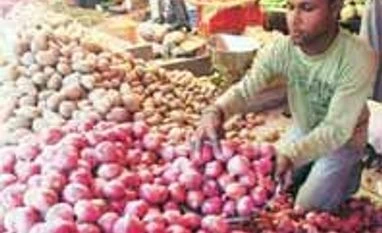It has also issued orders for a stringent control on black marketers and hoarders, and to ensure action is taken against them on a weekly basis. Onion, potato, rice and pulses are commodities whose prices are of particular importance, as their supplies can go down at a very short notice.
Officials in the know said directions to this regard were given during a review meeting on food prices taken by Cabinet Secretary Ajit Seth last week.
| ACTION PLAN |
Directions after review meeting by Cabinet Secretary Ajit Seth
|
The issue of food inflation due to low rain also figured in Tuesday's meeting between economists and the finance minister, some of whom suggested reducing import duties to facilitate supply.
Senior officials from the departments of food, agriculture, consumer affairs and finance participated in the meeting.
The southwest monsoon, lifeline for millions of farmers across the country, has till now made shaky progress after a delayed entry into the country.
Data from the India Meteorological Department showed the monsoon, as of Tuesday around Tamil Nadu and the northeastern states -during this period, it should have also covered much of Maharashtra, Karnataka, Andhra Pradesh and parts of West Bengal and Bihar. Rainfall across the country between June 1 and 8, the first week of the four-month southwest monsoon season, was almost 44 per cent less than normal.
At the meeting, some government departments had said clear measures needed to be taken immediately to ensure inflation was under control.
"Some thought it was an alarming situation, particularly with regard to food inflation," a senior official said.
Another official who was present said the focus would be on tackling supply-side issues. So far, the Reserve Bank of India (RBI) has tried to address the issue of price rise by keeping interest rates high but the core of the problem is supply-side bottlenecks.
Beside the short-term measures, introduction of the Goods & Services Tax and amendment or abolition of the Agricultural Produce Marketing Committees (APMC) Act could help combat inflation over a long term.
The government, it has been indicated, will evolve a mechanism which addresses the structural issues that create supply bottlenecks.
It will put in place strict measures and special courts to stop hoarding and black marketing. It will work on a single agriculture market and realtime information dissemination on prices to farmers and consumers in cooperation with states.
President Pranab Mukherjee, in his address to the joint session of Parliament on Monday, had highlighted inflation control, especially food inflation, through supply-side reforms, as the key concern of the government.
Wholesale Price Index-based inflation fell 0.5 percentage points to 5.2 per cent in April from 5.7 per cent in March, providing some relief to a new government but economists cautioned downside risks remained.
The movements were in contrast to Consumer Price Index-based inflation, the new nominal anchor for RBI, which rose to a three-month high of 8.59 per cent in April. Increase in prices of food and vegetables contributed to both.
)